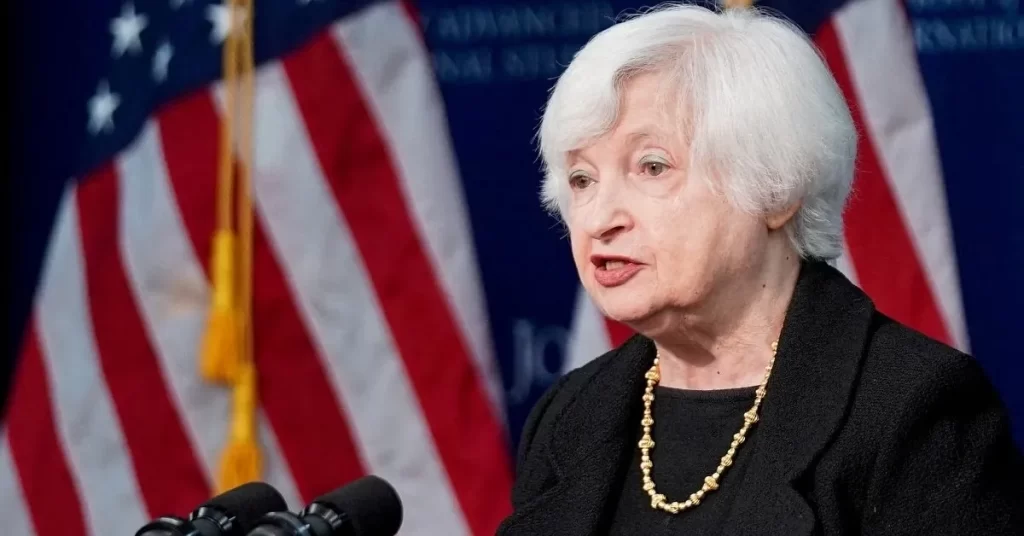Janet Yellen’s Warning on Potential Recession
Treasury Secretary Janet Yellen recently shared her cautious outlook on the United States’ economy, emphasizing that the possibility of a recession is still a concern. While the country appears to be on the right path to address inflation, Yellen believes that a complete dismissal of a potential recession would be premature. This article delves into Yellen’s statements, exploring the factors contributing to her concerns and analyzing the impact of President Biden’s economic policies (Bidenomics) on the country’s recovery. By examining the current economic landscape, we aim to provide insights into the potential risks and opportunities that lie ahead.
Assessing the June Jobs Report
Yellen’s remarks on a potential recession were prompted by the June jobs report, which showed weaker employment growth compared to previous months. With 209,000 jobs added in June, the figures fell short of May’s addition of 306,000 jobs. Despite the disappointing numbers, Yellen pointed out that the slower pace of job gains was expected due to the labor market’s recent expansion.
She further highlighted that the high level of prime age labor force participation, which is at its highest in several decades, indicates a strong job market that has successfully attracted workers back into employment. As the labor market stabilizes at this elevated level, a gradual decline in monthly job gains towards a more normal level can be anticipated.
Understanding Recession Indicators
To gauge the potential of a recession, economists consider various factors, including employment trends, consumer spending, and broader economic activity. The National Bureau of Economic Research defines a recession as a significant decline in economic activity spread across the economy for an extended period. While Yellen acknowledged that a recession is not guaranteed, she stressed the importance of vigilance and prudent decision-making.
Yellen’s cautious tone stems from the potential risks associated with inflation and uncertainties in the global economic landscape. The unprecedented impact of the COVID-19 pandemic on economies worldwide necessitates a careful assessment of indicators to ensure economic stability and sustainable growth.
The Role of Biden’s Economic Policies
Yellen credited President Joe Biden’s economic policies for the impressive rebound and recovery of the U.S. economy following the pandemic-induced downturn. She emphasized the swift action taken by the administration, coupled with the success of the nationwide vaccination campaign, as key factors in the country’s dramatic revival.
While Biden’s policies stimulated rapid growth, Yellen noted that the economy has now shifted towards a more sustainable trajectory, with growth moderating to more normal levels. The administration’s focus on job creation, infrastructure investment, and targeted support for sectors affected by the pandemic has been instrumental in fueling economic momentum.
Navigating Uncertainties and Promoting Stability
Yellen’s cautionary remarks serve as a reminder that the path to recovery is not without challenges. Ongoing concerns about inflation, global economic dynamics, and the potential for supply chain disruptions warrant careful attention. As the economy continues to evolve, policymakers must strike a delicate balance between stimulating growth and ensuring long-term stability.
Yellen’s call for vigilance underscores the importance of robust economic indicators, data-driven decision-making, and proactive policy adjustments. By remaining attuned to the evolving economic landscape, policymakers can navigate potential risks and seize opportunities for sustainable growth.
Conclusion
Treasury Secretary Janet Yellen’s warning on the potential of a recession serves as a reminder that economic recovery remains fragile in the face of ongoing uncertainties. While President Biden’s economic policies have fueled a remarkable rebound, cautious optimism is necessary to mitigate risks and promote stability. By closely monitoring indicators and implementing prudent policies, the United States can navigate potential challenges and build a resilient and sustainable economy. Vigilance, data-driven decision-making, and flexibility will be crucial in charting a course towards long-term economic prosperity.



